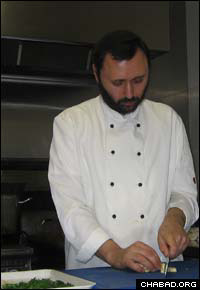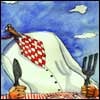David Trakhtman was not born a chef. In fact, it wasn't until he was married and working as a kosher supervisor at several New York restaurants that he even felt the kitchen's pull. But when he did, he was hooked.
It happened in a small kosher food joint on New York's Lower East Side, "a great little place in the wrong neighborhood," according to Trakhtman. He would watch the Bangladeshi chef at work. "This guy was so passionate and enthusiastic, so full of life. When you watch that, it's contagious.
"I caught the disease; I fell in love with cooking."
That excitement would send most people to culinary school, but Trakhtman wasn't sure there was a place for a kosher gourmet chef. Because of the relatively basic menus he had observed in restaurants, kosher cuisine was something of an oxymoron to him, and he was uninterested in becoming another mediocre cook.
His newfound passion simmered on the back burner.
Instead, Trakhtman focused on his Jewish studies, but oddly, the food connections started creeping in everywhere. He would observe a strawberry and see G‑d's artwork. To him, the science behind a banana was proof-positive of divinity. The prayer book and the saucepan became an inseparable team.
Still, he waited several years before concocting the perfect fusion of spice and spirit.
A Long Journey
Trakhtman, 32, was born in Vorkuta, Russia, north of the Arctic Circle. His family moved to Ukraine in 1984 and finally to Australia in 1993. From the top of the world to the bottom? No big deal, he says: "In Russia, you worried about leaving, not about what would be waiting at the other end."
While in Ukraine, his family befriended a Chabad-Lubavitch rabbi who encouraged Trakhtman to learn in Moscow's new Jewish high school, Tomchei Tmimim Lubavitch. Then, after moving to Australia, he left to attend Lubavitch yeshiva in Montreal and then New York. In New York, he met his future wife Vicki, an émigré from Uzbekistan.
It was during this period that he was "converted" to the religion of food.
After moving back to Melbourne, Australia, with his wife, Trakhtman realized that he wanted to pursue a culinary education more than anything else. With the strong support of his wife, he enrolled in the William Angliss Institute for Culinary Art in Melbourne.
While friends argued that if he would never be successful, "I knew I was making it just because I enjoyed what I was doing."
Of course, for an Orthodox Jew, culinary school presented some unique challenges. A whole host of Jewish dietary laws prevented his cooking meat and milk together, and he wouldn't be able to taste anything that wasn't kosher.
With the guidance of his local rabbi, Trakhtman put himself fully into his work. Perhaps as an added sign from above, his immediate supervisor and mentor was one Roman Giacometto, former executive chef in Jerusalem's King David Hotel.
"I would ask him what to substitute for the non-kosher ingredients," relates Trakhtman. "He knew everything right off the top of his head."
Meanwhile, the young rabbi began to apply his knowledge of Jewish law towards his cooking. He tested the heats described by the legal codes as "boiling," and "taste-infusing" and discovered how exact they were.
As for the banana, Trakhtman explains: "Scientists deconstructed a banana and found 279 individual taste components. They tried recreating it in a lab and could only come up with nine." Spirituality is all over this man's kitchen. "If you can't see G‑d in a sliced mango," he insists in a mock-Aussie accent, "you've lost it mate!"
Because he viewed food preparation as a way of creating art, he was shocked to see local restaurant owners cutting corners to save a buck. Where was the respect for the customer, for freshness? It became painfully clear to Trakhtman that the kosher market was a business before a gallery.
Something was going to change, and he was going to change it.
A Passion for Food

"I sensed his frustration and I saw that his food was not the same old fare," says Jacobs. "He wanted to rock the boat a little."
But most of all, she saw his passion; Passionate Catering was the result.
In the short time since Trakhtman began professional catering, he has heard compliments and received rave reviews. But nothing pleases him more than hearing non-kosher chefs express interest in kosher cuisine.
"They always thought kosher food was boring," he says. Now they are tasting a world of cuisine and loving it.
As for the G‑dliness, the chef-rabbi has created a seminar entitled, "How I Found G‑d Behind My Oven," to help bring his discoveries to a wider audience. As he puts it, "King David said in Psalms, 'Taste and you will see that G‑d is good.' " While some interpret this as a deep concept, Trakhtman is quite literal about it: "G‑d's goodness is in everything you taste."
Jacobs continues to follow the chef's journey. She is as drawn by his passion and drive as she is by his actual culinary art. She is thrilled to see how far he has come in reintroducing kosher food to the world.
"Kosher food isn't just fried fish and chopped herring," she points out.
Now, Trakhtman regularly caters Asian-themed meals with a very Jewish flavor. Last week, he worked an Indian menu for a private party of 35 people. Later, he delivered 55 gourmet meals to Melbourne's exclusive venue, ZINC at Federation Square.
The location "is the most exciting place in town," asserts Trakhtman. "The chef called to say this was the best kosher [food] ever brought into the venue."
In a moment of reflection, the chef asks rhetorically: "Why do non-kosher diners have to see kosher food as oily, drab and uninteresting? There is a lot of history in Jewish food. I want to present the legacy of my grandparents and ancestors from 500 years ago."








Start a Discussion